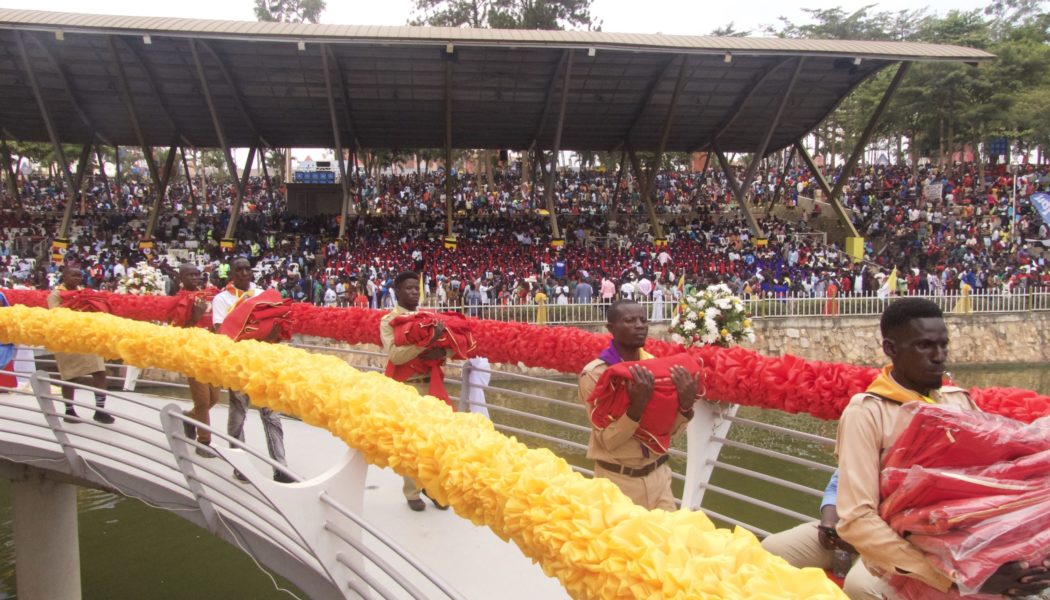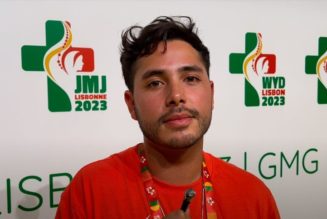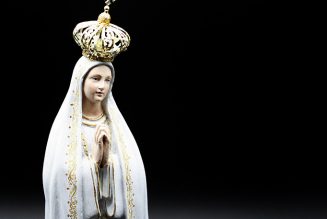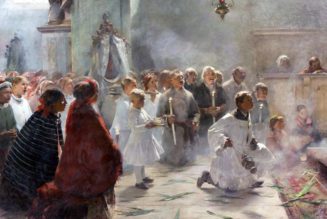NAMUGONGO, Uganda — In an extraordinary display of the vitality of the Catholic faith in Africa, a crowd of possibly more than 4 million people gathered for Mass today on the very same grounds where some of Africa’s earliest Catholics were put to death for their faith less than 140 years ago.
The annual celebration of the feast day of St. Charles Lwanga and Companions, 24 young converts who were martyred by King Mwanga in 1886, drew Catholics from across the continent and beyond to a vibrant, three-hour-long liturgical celebration at Basilica of the Uganda Martyrs in Namugongo, just outside of the nation’s capital of Kampala.
The celebration marked 60 years since the Ugandan martyrs were canonized by Pope St. Paul VI in the midst of the Second Vatican Council, making them the Church’s first canonized martyrs from sub-Saharan Africa.
Those gathered were a testament to the ongoing impact of St. Charles Lwanga and Companions on the Church in Africa — which has gone from under 2 million adherents in 1900 to 236 million just over a century later.
“This is really the roots of the Catholic faith in Africa,” Father Kizito Sabatia, a formator at the national seminary of Kenya who is also named for the youngest of the Ugandan martyrs, told the Register just before Mass began.
The Roots of African Catholicism
The importance of the Ugandan martyrs to all of Africa was on display in the swirl of national flags among the congregants seated on the Kampala hillside. Pilgrims came from neighboring East African countries like Kenya, Rwanda, Tanzania, South Sudan, and the Democratic Republic of the Congo, but also further-afield African nations like Cameroon, Botswana and South Africa.
Organizers even shared that some pilgrims had come from non-African countries like Argentina, Denmark, Colombia and Australia.
But the celebration was a decidedly African Catholic affair.
The liturgy demonstrated both the universality and distinctiveness of African Catholicism, as spirited songs in tribal languages that had the faithful clapping and swaying gave way to parts of the Mass chanted solemnly in English, a Latin recitation of the Lord’s Prayer, and periods of reflective silence.
African Catholicism was also expressed in the faithful’s attire, as brightly colored traditional dresses and headscarves worn by African women blended with the Catholic school and scout uniforms of the innumerable youth who attended Martyrs’ Day.

Around 20 bishops and hundreds of clergy and women and men religious — nearly all of them native Africans — also participated in the liturgy, a visible indication of how the faith has taken hold in the continent.
The Mass was also attended by several members of Uganda’s Parliament, Supreme Court justices, key ministers and even Ugandan President Yoweri Museveni — a dramatic indication of just how far Catholicism has come in the country from the day when the ruling monarch executed young pages who dared to accept the new faith and not renounce it.

“The Martyrs’ Day celebration symbolizes that faith has rooted itself in Africa,” said Oenegi Jenaro, a lay leader from the Diocese of Nebbi, Uganda, which was responsible for leading this year’s celebration.
Serving the Lord
This year’s Martyrs’ Day theme was taken from the Book of Joshua: “As for me and my household, we will serve the Lord” (24:15).

Archbishop-elect Raphael p’Mony Wokorach, Nebbi’s outgoing bishop, who is set to serve as the ordinary of the Archdiocese of Gulu, presided at the Mass, which was celebrated at a pavilion in the middle of a manmade lake a couple hundred yards from the basilica built on the spot where St. Charles Lwanga was killed. Some attendees sat in the arena seating around the pavilion, but the vast majority packed in across the rest of the forested grounds.

The Colomboni Missionary prelate said during his homily that Joshua’s insistence that the Jewish people “abandon the way of idolatry” was exemplified in the lives of St. Charles Lwanga and Companions — but that it also has special resonance for African Catholics today.
Archbishop-elect Wokorach warned against “living according to the idols we have created,” adding that “idolatry spreads like wildfire” and that responding to it is the challenge and the call of the Catholic Church.
The Ugandan prelate likely had traditional forms of African paganism in mind, which include polygamy, genital mutilation and ancestral worship, but may also have been referring to other influences, such as political corruption and secular sexual ideologies being pushed in Uganda and other African nations by the West.
The Ugandan archbishop-to-be encouraged those gathered to offer their lives to God like St. Charles Lwanga did and expressed his confidence that the day’s celebration would serve as a “new Pentecost” for the Church in Africa.

African Catholic Zeal
African Catholics’ zeal for their faith was expressed in many ways leading up to Martyrs’ Day, which is actually the culmination of more than a week of celebration.
In the days preceding June 3, many pilgrims made their way to Namugongo by foot, including 759 from the Diocese of Nebbi in the northwest of Uganda. Among those from Nebbi who made the 485-kilometer (301-mile), 12-day journey were an 11-year-old and an 81-year-old, as well as two pilgrims in wheelchairs.
In fact, one Martyrs’ Day pilgrim even reportedly gave birth during her time in Kampala, naming her new son Kizitio Raphael, after the youngest Ugandan martyr and the presider at the feast day’s liturgy.
Upon arriving in Kampala, pilgrims participated in Masses and other celebrations in the days leading up to Martyrs’ Day. In preparation for the big day itself, many even slept on the basilica’s grounds overnight, while others arrived well before dawn to attempt to secure a spot among the extraordinary crowds.
Official attendance numbers were not available at the time of publication, but organizers have estimated as many as 4 million at previous Martyrs’ Day celebrations, and local media reported that one organizer said this year’s “might be the largest crowd to ever attend this event.”

Participants often endured cramped quarters and heat, with several people needing medical attention during the event, and aggravated crowds on the verge of stampeding at various points after the liturgy.
But those who spoke with the Register, like Otyeka Emmanuel, a pilgrim from Nebbi, said the difficulties of the day were worth it.
“My prayer to God, if he hears it, is for my life not to be the same, so I go home changed,” said the first-time Martyrs’ Day attendee.

Ruth Mulindwa, a nurse in Wales, said she returned to Uganda for Martyrs’ Day because it “somehow strengthens my belief,” noting that people seem to rarely pray in the United Kingdom.
Regarding sleeping on the grounds overnight and the general discomfort of Martyrs’ Day — Mulindwa acknowledged that participating in the liturgy was “uncomfortable, but if you love what you are doing, it’s minor.”
“I treasure it a lot,” she said of the day’s festivities, adding that the witness of a fellow African like St. Charles Lwanga “somehow motivates you to also stick with your religion and your faith.”
Sacred Heart Brother Eugene Miti, who was attending Martyrs’ Day for the first time, told the Register that the extraordinary celebration was a sign that “we as Africans own the faith.”
“We own it, and we don’t take it as just something that was brought to us,” said the Zimbabwean religious. “It’s ours; it’s no longer just about the people who came to preach to us. That’s why we have the Ugandan martyrs: They owned the faith, and they loved it.”








